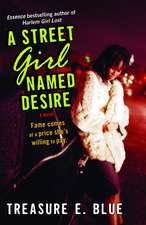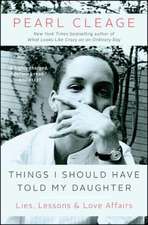Baby Brother's Blues
Autor Pearl Cleageen Limba Engleză Paperback – 31 ian 2007
Then everything changed. More and more frightened women were showing up in West End, seeking Blue’s protection from lovers who had suddenly become violent. When the worst offenders begin to disappear without a trace, the signs–all of them grim–seem to point toward Blue and his longtime associate, Joseph “General” Richardson. Now that Regina is pregnant, her fear for Blue’s safety has become an obsession that threatens the very heart of their relationship.
At the same time, Regina’s friend Aretha Hargrove is desperately trying to redefine her own marriage. Aretha’s husband, Kwame, is lobbying for them to leave West End and move to midtown. Aretha resists at first, but finally agrees in an effort to rekindle the flame that first brought them together.
Regina and Aretha have no way of knowing that what they regard as their private struggles will soon become very public. When Baby Brother, a charming con man, insinuates himself into the community, it becomes clear that there is more to his handsome façade than meets the eye. He carries the seeds of change that will affect both women in profound and startling ways.
Returning to the vividly rendered Atlanta district of her last two novels, New York Times bestselling author Pearl Cleage brilliantly weaves the threads of her characters’ intersecting lives into a story of family, friendship and, of course, love. Baby Brother’s Blues is full of wit and warmth, illumination the core of every woman’s hopes and dreams.
From the Hardcover edition.
Preț: 133.80 lei
Nou
Puncte Express: 201
Preț estimativ în valută:
25.61€ • 26.63$ • 21.14£
25.61€ • 26.63$ • 21.14£
Carte tipărită la comandă
Livrare economică 15-29 aprilie
Preluare comenzi: 021 569.72.76
Specificații
ISBN-13: 9780345481115
ISBN-10: 0345481119
Pagini: 348
Dimensiuni: 132 x 204 x 21 mm
Greutate: 0.27 kg
Editura: ONE WORLD
ISBN-10: 0345481119
Pagini: 348
Dimensiuni: 132 x 204 x 21 mm
Greutate: 0.27 kg
Editura: ONE WORLD
Notă biografică
Pearl Cleage is the author of What Looks Like Crazy on an Ordinary Day . . . , an Oprah’s Book Club selection; Some Things I Never Thought I’d Do, a Good Morning America Read This! book club pick; and Babylon Sisters. She is also the author of two works of nonfiction: Mad at Miles: A Black Woman’s Guide to Truth and Deals with the Devil and Other Reasons to Riot; as well as the poem We Speak Your Names. Also an accomplished dramatist, her plays include Flyin’ West and Blues for an Alabama Sky. Cleage lives in Atlanta with her husband, Zaron W. Burnett Jr.
To schedule a speaking engagement, please contact American Program Bureau at www.apbspeakers.com
From the Hardcover edition.
To schedule a speaking engagement, please contact American Program Bureau at www.apbspeakers.com
From the Hardcover edition.
Extras
Regina was waiting for Blue. To the untrained eye, she looked like any other attractive, energetic black woman in her midthirties, going about her normal Saturday tasks. She stopped at the drugstore for some mouthwash, bought fifty of the James Baldwin commemorative stamps at the post office, had a long lunch at the Soul Vegetarian restaurant. Adrift in an afternoon of waiting, Regina was looking for something, anything, to distract her from counting the hours as they passed at their usual speed, although she could have sworn they were barely crawling by.
It had started last night. As she watched her husband pull on his black cashmere coat and reach for his perfectly blocked homburg, she was suddenly afraid of where he was going and what he might do when he got there.
“Blue,” she said softly, “I don’t think I can do this anymore.”
Her timing was terrible. He had already uttered the phrase that served as their signal to announce the always surreal moment when her husband left their house, got into a big, black Lincoln with General Richardson, and disappeared into the night. What he did in these moments he did without the sanction of anyone or anything, other than his absolute confidence in the accuracy of his own moral compass and the trust and permission of the people who protected him with their loyalty, their gratitude, and their silence.
Her words floated there between them. Blue, his hand already on the doorknob, stopped to look at her standing nervously in the darkened hallway. Even in the low light, she could see his eyes gleaming, blue as a clear mountain stream, fathoms deep and ancient. She shivered. After two years of marriage, the always unexpected color of her husband’s otherworldly eyes still surprised her, twinkling like sapphires in his dark brown face.
Although he had his mother’s high cheekbones and his father’s lean, compact physique, Blue was the only one in his family with those eyes. Speculation about where they came from had poisoned his father against his mother, although she was innocent of any infidelity. Many years later, after her aunt Abbie predicted correctly that Regina would come to Atlanta and fall in love with a man “who had the ocean in his eyes,” Blue confirmed Abbie’s theory that his eyes were a way to be sure that in this lifetime, unlike the last two when they had missed each other by a hair, Regina couldn’t walk past him without noticing. This time around, that would have been impossible.
At this moment, her husband’s blue eyes were dark pools, magical and mysterious, full of questions she had to answer.
“Can’t do what, baby?” His voice was gentle, but she knew that General was already waiting for Blue out front. This was no time to talk.
Regina spread her arms wide, palms up, and looked at him helplessly. “This. You know, this.”
His eyes softened a little, but he didn’t come toward her. She felt time passing, but Blue seemed not to notice. She had never seen him become impatient and he didn’t now. Regina, however, was increasingly uncomfortable. The idea startled her. She was never uncomfortable around Blue. How could she be? He knew her thoughts almost before she did. She had even accused him of mind reading once or twice, and he hadn’t denied it. But she didn’t want him to read her mind tonight. There were some things that deserved a moment all their own. A moment not already weighted down by midnight comings and going, and cars with tinted windows, and drivers who waited out front with the motor running.
“Sometimes I worry, that’s all.” She walked up to him and kissed his cheek softly. He smelled like citrus.
He smiled at her, his eyes now the turquoise of the Caribbean Sea on a perfect Jamaica day.
He put his arms around her and kissed her so long and slow and deep, she felt her knees tremble. “Don’t worry,” he said, putting on his hat and opening the door.
“Be careful.”
“Careful as I can.” And he was gone.
That was when she started waiting, thirty-six hours twenty-eight minutes and thirty-two seconds ago, which was a lot of waiting, even for Regina. Lately, things had been peaceful and she wanted them to stay that way. Before the current calm descended, there had been a year of barely controlled chaos following the disappearance of two of the surrounding neighborhood’s worst predators, a pimp who called himself King James, and his half-witted henchman, known appropriately as DooDoo. Their thuggish followers had made several angry incursions into West End, the area that her husband had taken under his protective wing before Regina ever met him, and where they now lived quietly in a beautifully restored Victorian house with a huge vegetable garden out back and roses out front that seemed to bloom all year long.
Blue’s reaction to these brutal attacks on the peace, which usually involved violence against women and children, was immediate and, she suspected, sometimes fatal. It wasn’t something they talked about anymore. What was there to say? Regina had married Blue Hamilton knowing exactly who and what he was. His entrance into her life had been so accurately predicted by her aunt, the self-proclaimed “postmenopausal visionary adviser,” that when he walked out of the bright blue front door of one of the many apartment buildings he owned in West End, she recognized him with a jolt of physical desire and emotional memory that made her blush like a schoolgirl.
Later, as they got to know each other, he had told her in all seriousness about what he perceived as his failure in a past life to lead his people when he was their emperor. If that wasn’t enough for her to consider, he movingly described her role in the women’s resistance to his regime’s corruption. His words triggered a flood of her own blood memories and made her know that he was telling the truth.
Blue’s acceptance of the responsibility the neighborhood had informally conferred upon him a decade ago as their de facto godfather grew as much out of his desire to atone for his empire’s past-life crimes against women as it did out of his need to provide the leadership and focus West End required. Like most African American urban neighborhoods, the community’s biggest challenges were youthful predators, middle-aged desperadoes, wannabe gangsters of all ages, and domestic bullies who preyed upon the women and children trying desperately to love them.
In response to these ever-present threats, what Blue promised was that in the twenty-odd square blocks under his control, women would be safe, men would be sane, and children would act like they had some sense. It was a peaceful oasis in a sea of neighborhoods plagued by guns and crack, desperation and despair. Part of what Regina loved and respected about Blue was his willingness to provide protection for ordinary black folks who only wanted to go to work when they could find it, raise their children once they had them, pay their bills as close to on time as possible, and grow old in peace in the little houses they had paid for in exchange for all the hard work that defined their lives.
The only problem arose when Regina took a good long look at exactly how Blue was able to do all that. How was one man—even one as smart and strong and charismatic as her husband—able to keep the streets so peaceful that women walked unescorted and unafraid to the twenty-four-hour beauty shop and there hadn’t been a rape in ten years? It was a legiti-mate question, and Regina was a smart woman. She knew the answer.
In the interest of her own peace of mind, she tried not to think about it too specifically. She didn’t ask Blue any questions to which she didn’t really want answers, and he didn’t volunteer information that might be more than a loving wife needed to know about her loving husband in the general ebb and flow of their everyday lives. Blue’s other role was something separate and they both knew it. To minimize the strangeness of the transi- tion moments, they had developed a kind of verbal shorthand. When he stepped into his other role, he would simply say he had “business to at- tend to,” a phrase he never used any other time. She would tell him to be careful.
“Careful as I can,” he would always say. “Careful as I can.”
Sometimes his business took only a few hours. Other times he was gone overnight, and once or twice longer. Those were the worst times. Those endless hours gave her too much time to imagine that he had come to harm. She closed her eyes, banishing the thought, suddenly panicked at sending out such negative energy into the universe that something evil might turn in her husband’s direction.
Regina took a deep breath and tried to calm down. She watched a movie on television, perused a magazine or two, flipped through the pages of a new novel she had been curious about. Finally, around hour forty-two, she went upstairs and pulled her favorite rocking chair up to the bedroom window. It was September and the nights were just starting to cool off from an August that had alternated between one-hundred-degree sunshine and monsoon-force rains that overwhelmed the city’s aging infrastructure and made many of Atlanta’s thoroughfares fast-flowing rivers of rainwater and big-city rubbish.
Tonight, there was no rain in sight and none predicted. Just the barest suggestion of a chill. Regina wrapped her gray shawl around her shoulders and decided to stop pretending she wasn’t waiting for Blue. There was no reason to pretend anything. There wasn’t even anyone around to pretend to, unless she counted the baby. The baby. She loved the sound of the words in her head, even though she had yet to speak them out loud. Her doctor had confirmed what her home pregnancy test had told her. She was ecstatic, but before she could tell Blue, he had said he had “business to attend to,” and all bets were off. She was going to have her husband’s child and he didn’t even know it yet. Too busy saving the world to hear the big news!
Regina tried to work up some indignation, but she couldn’t. Blue wasn’t off somewhere “saving the world.” He was securing this one small spot on the map for his wife, and soon, for his child. He was doing what a man was supposed to do if he was really a man, and if he was anything at all, her husband was one hundred percent man. If she had anything to say about it, this baby would grow up proud to call Blue Hamilton Daddy.
“Don’t worry, baby,” Regina whispered, wrapping her arms around her body and rocking the chair slowly. “Daddy’s on his way home right now. I can almost feel it, can’t you?”
Outside in the street, an old man and woman strolled by, arm in arm, laughing and talking easily, their strides in perfect sync like they had been walking together for more years than they had walked apart. Regina watched them unobserved from the darkened window, and as she did, the man stopped suddenly, leaned over, and kissed the woman right in the middle of whatever story she was telling.
“You’re crazy!” Regina heard the woman say, and the man beside her didn’t deny it.
“If I’m crazy for kissin’ my own wife, then send my black ass to the asylum and I won’t even be mad!”
The woman shushed him gently, laughing. Regina smiled to herself as they continued down the street and out of sight. She was happy that they still made each other laugh and that they lived in a place where they could take that laughter out for an evening stroll unmolested. They could walk at midnight if they wanted to and be as safe as if it was high noon. Six blocks away that would be impossible. The presence of predators was too real and too dangerous. But in West End, there was still time and space for lovers, and Regina knew who they had to thank for that.
She pulled her shawl a little tighter around her body. “Don’t worry, baby,” she whispered again. “Daddy’s on his way.”
From the Hardcover edition.
It had started last night. As she watched her husband pull on his black cashmere coat and reach for his perfectly blocked homburg, she was suddenly afraid of where he was going and what he might do when he got there.
“Blue,” she said softly, “I don’t think I can do this anymore.”
Her timing was terrible. He had already uttered the phrase that served as their signal to announce the always surreal moment when her husband left their house, got into a big, black Lincoln with General Richardson, and disappeared into the night. What he did in these moments he did without the sanction of anyone or anything, other than his absolute confidence in the accuracy of his own moral compass and the trust and permission of the people who protected him with their loyalty, their gratitude, and their silence.
Her words floated there between them. Blue, his hand already on the doorknob, stopped to look at her standing nervously in the darkened hallway. Even in the low light, she could see his eyes gleaming, blue as a clear mountain stream, fathoms deep and ancient. She shivered. After two years of marriage, the always unexpected color of her husband’s otherworldly eyes still surprised her, twinkling like sapphires in his dark brown face.
Although he had his mother’s high cheekbones and his father’s lean, compact physique, Blue was the only one in his family with those eyes. Speculation about where they came from had poisoned his father against his mother, although she was innocent of any infidelity. Many years later, after her aunt Abbie predicted correctly that Regina would come to Atlanta and fall in love with a man “who had the ocean in his eyes,” Blue confirmed Abbie’s theory that his eyes were a way to be sure that in this lifetime, unlike the last two when they had missed each other by a hair, Regina couldn’t walk past him without noticing. This time around, that would have been impossible.
At this moment, her husband’s blue eyes were dark pools, magical and mysterious, full of questions she had to answer.
“Can’t do what, baby?” His voice was gentle, but she knew that General was already waiting for Blue out front. This was no time to talk.
Regina spread her arms wide, palms up, and looked at him helplessly. “This. You know, this.”
His eyes softened a little, but he didn’t come toward her. She felt time passing, but Blue seemed not to notice. She had never seen him become impatient and he didn’t now. Regina, however, was increasingly uncomfortable. The idea startled her. She was never uncomfortable around Blue. How could she be? He knew her thoughts almost before she did. She had even accused him of mind reading once or twice, and he hadn’t denied it. But she didn’t want him to read her mind tonight. There were some things that deserved a moment all their own. A moment not already weighted down by midnight comings and going, and cars with tinted windows, and drivers who waited out front with the motor running.
“Sometimes I worry, that’s all.” She walked up to him and kissed his cheek softly. He smelled like citrus.
He smiled at her, his eyes now the turquoise of the Caribbean Sea on a perfect Jamaica day.
He put his arms around her and kissed her so long and slow and deep, she felt her knees tremble. “Don’t worry,” he said, putting on his hat and opening the door.
“Be careful.”
“Careful as I can.” And he was gone.
That was when she started waiting, thirty-six hours twenty-eight minutes and thirty-two seconds ago, which was a lot of waiting, even for Regina. Lately, things had been peaceful and she wanted them to stay that way. Before the current calm descended, there had been a year of barely controlled chaos following the disappearance of two of the surrounding neighborhood’s worst predators, a pimp who called himself King James, and his half-witted henchman, known appropriately as DooDoo. Their thuggish followers had made several angry incursions into West End, the area that her husband had taken under his protective wing before Regina ever met him, and where they now lived quietly in a beautifully restored Victorian house with a huge vegetable garden out back and roses out front that seemed to bloom all year long.
Blue’s reaction to these brutal attacks on the peace, which usually involved violence against women and children, was immediate and, she suspected, sometimes fatal. It wasn’t something they talked about anymore. What was there to say? Regina had married Blue Hamilton knowing exactly who and what he was. His entrance into her life had been so accurately predicted by her aunt, the self-proclaimed “postmenopausal visionary adviser,” that when he walked out of the bright blue front door of one of the many apartment buildings he owned in West End, she recognized him with a jolt of physical desire and emotional memory that made her blush like a schoolgirl.
Later, as they got to know each other, he had told her in all seriousness about what he perceived as his failure in a past life to lead his people when he was their emperor. If that wasn’t enough for her to consider, he movingly described her role in the women’s resistance to his regime’s corruption. His words triggered a flood of her own blood memories and made her know that he was telling the truth.
Blue’s acceptance of the responsibility the neighborhood had informally conferred upon him a decade ago as their de facto godfather grew as much out of his desire to atone for his empire’s past-life crimes against women as it did out of his need to provide the leadership and focus West End required. Like most African American urban neighborhoods, the community’s biggest challenges were youthful predators, middle-aged desperadoes, wannabe gangsters of all ages, and domestic bullies who preyed upon the women and children trying desperately to love them.
In response to these ever-present threats, what Blue promised was that in the twenty-odd square blocks under his control, women would be safe, men would be sane, and children would act like they had some sense. It was a peaceful oasis in a sea of neighborhoods plagued by guns and crack, desperation and despair. Part of what Regina loved and respected about Blue was his willingness to provide protection for ordinary black folks who only wanted to go to work when they could find it, raise their children once they had them, pay their bills as close to on time as possible, and grow old in peace in the little houses they had paid for in exchange for all the hard work that defined their lives.
The only problem arose when Regina took a good long look at exactly how Blue was able to do all that. How was one man—even one as smart and strong and charismatic as her husband—able to keep the streets so peaceful that women walked unescorted and unafraid to the twenty-four-hour beauty shop and there hadn’t been a rape in ten years? It was a legiti-mate question, and Regina was a smart woman. She knew the answer.
In the interest of her own peace of mind, she tried not to think about it too specifically. She didn’t ask Blue any questions to which she didn’t really want answers, and he didn’t volunteer information that might be more than a loving wife needed to know about her loving husband in the general ebb and flow of their everyday lives. Blue’s other role was something separate and they both knew it. To minimize the strangeness of the transi- tion moments, they had developed a kind of verbal shorthand. When he stepped into his other role, he would simply say he had “business to at- tend to,” a phrase he never used any other time. She would tell him to be careful.
“Careful as I can,” he would always say. “Careful as I can.”
Sometimes his business took only a few hours. Other times he was gone overnight, and once or twice longer. Those were the worst times. Those endless hours gave her too much time to imagine that he had come to harm. She closed her eyes, banishing the thought, suddenly panicked at sending out such negative energy into the universe that something evil might turn in her husband’s direction.
Regina took a deep breath and tried to calm down. She watched a movie on television, perused a magazine or two, flipped through the pages of a new novel she had been curious about. Finally, around hour forty-two, she went upstairs and pulled her favorite rocking chair up to the bedroom window. It was September and the nights were just starting to cool off from an August that had alternated between one-hundred-degree sunshine and monsoon-force rains that overwhelmed the city’s aging infrastructure and made many of Atlanta’s thoroughfares fast-flowing rivers of rainwater and big-city rubbish.
Tonight, there was no rain in sight and none predicted. Just the barest suggestion of a chill. Regina wrapped her gray shawl around her shoulders and decided to stop pretending she wasn’t waiting for Blue. There was no reason to pretend anything. There wasn’t even anyone around to pretend to, unless she counted the baby. The baby. She loved the sound of the words in her head, even though she had yet to speak them out loud. Her doctor had confirmed what her home pregnancy test had told her. She was ecstatic, but before she could tell Blue, he had said he had “business to attend to,” and all bets were off. She was going to have her husband’s child and he didn’t even know it yet. Too busy saving the world to hear the big news!
Regina tried to work up some indignation, but she couldn’t. Blue wasn’t off somewhere “saving the world.” He was securing this one small spot on the map for his wife, and soon, for his child. He was doing what a man was supposed to do if he was really a man, and if he was anything at all, her husband was one hundred percent man. If she had anything to say about it, this baby would grow up proud to call Blue Hamilton Daddy.
“Don’t worry, baby,” Regina whispered, wrapping her arms around her body and rocking the chair slowly. “Daddy’s on his way home right now. I can almost feel it, can’t you?”
Outside in the street, an old man and woman strolled by, arm in arm, laughing and talking easily, their strides in perfect sync like they had been walking together for more years than they had walked apart. Regina watched them unobserved from the darkened window, and as she did, the man stopped suddenly, leaned over, and kissed the woman right in the middle of whatever story she was telling.
“You’re crazy!” Regina heard the woman say, and the man beside her didn’t deny it.
“If I’m crazy for kissin’ my own wife, then send my black ass to the asylum and I won’t even be mad!”
The woman shushed him gently, laughing. Regina smiled to herself as they continued down the street and out of sight. She was happy that they still made each other laugh and that they lived in a place where they could take that laughter out for an evening stroll unmolested. They could walk at midnight if they wanted to and be as safe as if it was high noon. Six blocks away that would be impossible. The presence of predators was too real and too dangerous. But in West End, there was still time and space for lovers, and Regina knew who they had to thank for that.
She pulled her shawl a little tighter around her body. “Don’t worry, baby,” she whispered again. “Daddy’s on his way.”
From the Hardcover edition.
Recenzii
Praise for Pearl Cleage and Babylon Sisters
“Pearl Cleage’s wonderful new novel, Babylon Sisters, shows a writer at the top of her game, managing to weave together the eternal dance of mothers and daughters, a timeless love story, rich friendships, and international politics into a fast-paced Atlanta saga with an unforgettable villain and a thrilling climax that leaves us cheering. Cleage has once again given us a book filled with folks who are so real we think we know them, or wish we did.”
–E. Lynn Harris, author of A Love of My Own
“Babylon Sisters’ funny, feminine, fabulous voice sings a story of history, family, love and redemption. Cleage’s ability to make the personal political and the political personal triumphs once again! Nestled in this beautifully written ode to love–of child, friends, men, and self–is a call to political activism and empowerment.”
–Jill Nelson, author of Sexual Healing
“Cleage writes with amazing grace and [a] killer instinct.”
–The New York Times
“A perfect blend of love and activism . . . [Cleage’s] characters struggle with issues of conscience and consequence, and readers are always richer in the end.”
–The Atlanta Journal-Constitution
From the Hardcover edition.
“Pearl Cleage’s wonderful new novel, Babylon Sisters, shows a writer at the top of her game, managing to weave together the eternal dance of mothers and daughters, a timeless love story, rich friendships, and international politics into a fast-paced Atlanta saga with an unforgettable villain and a thrilling climax that leaves us cheering. Cleage has once again given us a book filled with folks who are so real we think we know them, or wish we did.”
–E. Lynn Harris, author of A Love of My Own
“Babylon Sisters’ funny, feminine, fabulous voice sings a story of history, family, love and redemption. Cleage’s ability to make the personal political and the political personal triumphs once again! Nestled in this beautifully written ode to love–of child, friends, men, and self–is a call to political activism and empowerment.”
–Jill Nelson, author of Sexual Healing
“Cleage writes with amazing grace and [a] killer instinct.”
–The New York Times
“A perfect blend of love and activism . . . [Cleage’s] characters struggle with issues of conscience and consequence, and readers are always richer in the end.”
–The Atlanta Journal-Constitution
From the Hardcover edition.
Descriere
Cleage's new novel reads like an African-American version of Armistead Maupin's "Tales of the City." It is a book populated by numerous characters whose lives intersect and diverge, come together and draw apart. But instead of Maupin's San Francisco, the setting of Cleage's book is Atlanta.



















